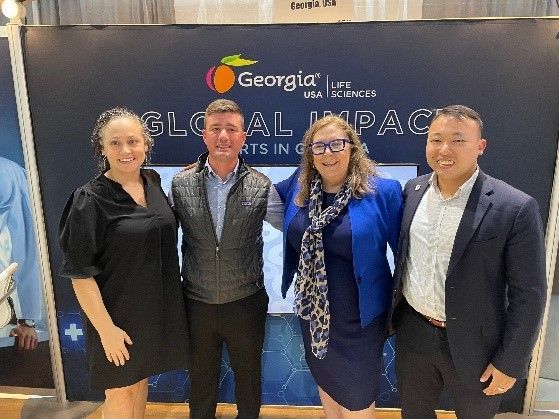Georgia Bio Announces Forsyth County as Newest BioReady® Community at BIO International Convention
June 7, 2024, San Diego, CA – Forsyth County has been designated a BioReady® Bronze Community by the state’s leading life sciences membership organization, Georgia Bio. To receive this distinction, communities must meet certain criteria and be able to support the growing biotech industry. This distinctive honor was presented to Forsyth County this week at the BIO International Convention in San Diego, California, the largest biotechnology gathering in the world.
“The life sciences sector represents a meaningful portion of the vast business being done in this state, and establishing BioReady® sites, like Forsyth County, signifies Georgia’s readiness for future growth in this industry,” said Maria Thacker-Goethe, President and CEO of Georgia Bio. “This program allows municipalities to showcase biotech-zoned science parks, streamline permitting, build a robust infrastructure, and identify biotech-friendly sites more effectively, making them a desirable choice for industry and a benefit to Georgia’s overall economy.”
“Georgia prioritizes long-term partnerships, creating opportunities for collaborative solutions such as BioReady® Communities,” said Kristi Brigman, Deputy Commissioner of Global Commerce at the Georgia Department of Economic Development. “From the top-tier colleges and universities in Georgia that are educating diverse talent to the state’s ‘Georgia Ready for Accelerated Development’ site certification program that accelerates the path to success, Georgia works with companies throughout the life of a project starting with the very first handshake. We are thrilled that Forsyth County is leveraging their assets to further strengthen these relationships with the bioscience community.”
As the state’s largest and most influential life sciences advocacy and business leadership organization, Georgia Bio works to improve access to innovative technologies and grow Georgia’s life sciences economy. Forsyth County has seen recent growth in the sector with wins such as pharmaceutical company Alimera Sciences moving its headquarters to the Halcyon development. Additionally, Forsyth County Schools have been introducing life science careers to students in partnership with the Georgia BioEd Institute for years to support the industry’s workforce needs.
The BioReady® rating system rates communities in three tiers from Bronze to Silver to Gold. Through these BioReady® ratings, Georgia Bio seeks to provide cities and towns a platform to effectively tell their stories to the biotechnology industry, ultimately helping real estate developers and biotechnology companies find the most favorable destinations to locate.
Georgia Bio launched the BioReady® Community program in Georgia with the support from the non-profit’s partners at MassBio, a global life sciences and healthcare organization dedicated to advancing Massachusetts’ position in the life sciences. With a goal of helping local communities connect with leading life sciences industry representatives, Georgia Bio replicated the MassBio rating system program to determine a municipality’s readiness to host biotechnology facilities based on the community’s zoning practices and infrastructure capacity.
Learn more on the Georgia Bio’s BioReady Communities website.
About Georgia Bio
Georgia Bio (GaBio) is the state’s most impactful life sciences membership organization, advocating for the sector and its diverse innovation pipeline. For more than 30 years, GaBio has served its members by supporting companies of all sizes, from early-stage innovators and startups to established industry leaders in the fields of biotechnology, pharmaceuticals, and medical technology. GaBio also works closely with universities, academic and research institutions, the investment community, and other critical partners that promote this vibrant sector. GaBio works to shape public policy, improve access to breakthrough technologies, educate lawmakers, provide member programs, strengthens the workforce pipeline, and advance equity within our ecosystem by championing innovative solutions for some of the most pressing challenges of our times. For more information, visit www.gabio.org.

Pictured left to right: Maria Thacker, Georgia Bio; Alex Warner, VP of Economic Development, Forward Forsyth; EJane Caraway, Director, Life Sciences, Georgia Department of Economic Development; and Eddie Lai, Senior Manager, Life Sciences & Digital Health, Metro Atlanta Chamber.





